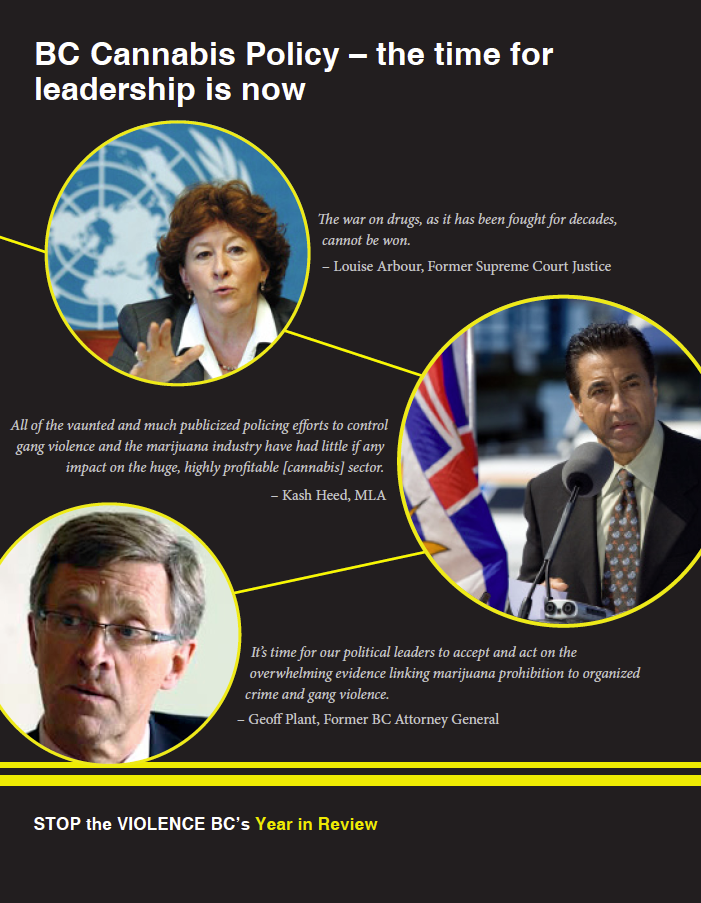Increasing Majority of British Columbians Support Ending Cannabis Prohibition – Public Opinion Reaches Tipping Point
New poll shows 75% support taxation and regulation of cannabis; Public Health Association of BC latest to join Stop the Violence BC coalition
Vancouver, B.C. [November 1, 2012] — A new Angus Reid poll released today overwhelmingly shows that British Columbians favour moving away from cannabis prohibition toward a system of regulation and taxation, and that lawmakers continue to lag far behind public opinion on revamping cannabis laws in B.C.
DOWNLOADS: Report, Polling Data
The survey, conducted between October 22 and 24, found that 75% of B.C. respondents support the taxation and regulation of cannabis over chasing and arresting cannabis producers and sellers, a jump of six percentage points from just one year ago.
“These results reveal a quite remarkable and growing dissatisfaction among British Columbians with the status quo and an eagerness for policymakers to pursue an entirely new approach to cannabis policy,” said Mario Canseco, Vice President, Angus Reid Public Opinion. “These beliefs cut across political, social and regional lines. I can’t think of any other issue where the laws on the books are inconsistent with the wishes of three-quarters of British Columbians.”
The poll results come a year after a similar Angus Reid survey, and demonstrate increasing public opinion that cannabis prohibition in B.C. has been ineffective and caused significant social harms and public safety issues, such as increased organized crime, gang violence and illegal marijuana grow ops.
Key Angus Reid poll data:
- Only 14% of British Columbians believe possession of a marijuana cigarette should lead to a criminal record, down from 20% one year ago
- 75% support the taxation and regulation of cannabis over chasing and arresting cannabis producers and sellers, an increase of six percentage points from 2011
- 74% would be comfortable living in a society where adult cannabis consumption was taxed and legally regulated under a public health framework, an increase of four percentage points from last year
- At 62%, fewer BC residents support decriminalizing marijuana use than the proportion that support outright taxation and regulation
The poll surveyed 799 respondents in B.C. The results have a margin of error of plus or minus 3.5 percentage points.
The Angus Reid survey was released by Stop the Violence BC (STVBC), a growing coalition of academic, legal, law enforcement and health experts calling for the reform of cannabis laws to reduce the unintended harms attributable to the illegal cannabis trade, including the growth of organized crime and gang violence. A STVBC report marking the achievements during the year since the coalition’s launch, entitled BC Cannabis Policy: The time for leadership is now, was released in tandem with the polling results.
“From a scientific and public safety perspective, making cannabis illegal has clearly been an expensive and harmful failure,” said Dr. Evan Wood, founder of Stop the Violence BC and Canada Research Chair in Inner City Medicine at UBC. “With 75% of British Columbians supporting change, and the status quo contributing to increasing harms in B.C. communities, it is absolutely time for politicians to catch up with the public.”
PHABC latest to join call for ending cannabis prohibition
Along with the release of the report and polling data, the Public Health Association of BC (PHABC) became the latest prominent expert body to endorse the Stop the Violence BC campaign. PHABC is a voluntary, non-profit, non-government organization comprised of B.C.’s public health leaders whose mission is to preserve and promote the public’s health.
“From a public health perspective, we urgently need to research alternatives to our current approach to cannabis which has clearly failed to protect public health and has actually resulted in substantial individual and community harms,” said Dr. Marjorie MacDonald, President of PHABC. “Whether it be the organized crime concerns, the free and easy availability of marijuana that exists under prohibition, the life altering negative consequences of a criminal record for an otherwise law abiding young person or simply the enormous waste of public resources – all are reasons to reform this failed policy. Strict regulation, guided by proven public health principles, is clearly the logical way forward.”
Since launching a year ago, STVBC has received many high-profile endorsements from across the law enforcement, public health and political sectors, including the Health Officers Council of BC, four former mayors of Vancouver and four former B.C. attorneys general. The PHABC endorsement follows noteworthy support from eight current B.C. mayors and the passing in September of a Union of BC Municipalities (UBCM) resolution calling for research into the taxation and regulation of cannabis.
A call for political leadership
In its report, STVBC highlights the discordance between government policy in B.C. and the recommendations of leading British Columbian experts and the wishes of the public. The report urges provincial politicians to demonstrate their leadership by telling British Columbians that they support researching a new approach involving a pilot study of the strict regulation and taxation of adult cannabis use under a public health framework.
“Our politicians are clearly out of step with public opinion when it comes to cannabis policy,” said Kash Heed, MLA for Vancouver-Fraserview
B.C. now risks falling behind its U.S. neighbours when it comes to cannabis prohibition. Next week, three states will vote on ballot measures to approve the taxation and regulation of adult marijuana use, including Washington State, where voters will vote on Initiative 502. STVBC coalition members argued this week in a Seattle Times op-ed that if Initiative 502 is passed, it could help cripple B.C.’s gangs.
STVBC is encouraging policymakers at all levels of government to contact them with any questions about how B.C. could support a new approach to cannabis policy.
– 30 –
About Stop the Violence BC
Stop the Violence BC is a coalition of law enforcement officials, legal experts, public health officials and academic experts from the University of British Columbia, Simon Fraser University, University of Victoria and the University of Northern BC. Coalition members have come together to engage all British Columbians in a discussion aimed at developing and implementing cannabis-related policies that improve public health while reducing social harms, including violent crime. For a listing of coalition members and to learn more about the coalition, please visit www.stoptheviolencebc.org/about-us.
About Angus Reid Public Opinion
Angus Reid Public Opinion is the Public Affairs practice of Vision Critical headed by Dr. Angus Reid: an industry visionary who has spent more than four decades asking questions to figure out what people feel, how they think and who they will vote for.
Media: to speak to a member of the Stop the Violence BC coalition, please contact:
Kevin Hollett
604 682 2344 ext 66536
[email protected]
Sunny McKechnie
250 816 7610
[email protected]








